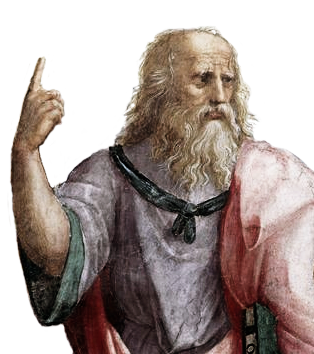
Gorgias (dialogue)
Gorgias (/ˈɡɔːrɡiəs/;[1] Greek: Γοργίας [ɡorɡíaːs]) is a Socratic dialogue written by Plato around 380 BC. The dialogue depicts a conversation between Socrates and a small group at a dinner gathering. Socrates debates with self-proclaimed rhetoricians seeking the true definition of rhetoric, attempting to pinpoint the essence of rhetoric and unveil the flaws of the sophistic oratory popular in Athens at the time. The art of persuasion was widely considered necessary for political and legal advantage in classical Athens, and rhetoricians promoted themselves as teachers of this fundamental skill. Some, like Gorgias, were foreigners attracted to Athens because of its reputation for intellectual and cultural sophistication. Socrates suggests that he (Socrates) is one of the few Athenians to practice true politics (521d).[2]
Major themes[edit]
Definition of rhetoric[edit]
Socrates interrogates Gorgias to determine the true definition of rhetoric, framing his argument in the question format, "What is X?" (2).[3] He asks, "… why don’t you tell us yourself what the craft you’re an expert in is, and hence what we’re supposed to call you?" (449e).
Throughout the remainder of the dialogue, Socrates debates about the nature of rhetoric. Although rhetoric has the potential to be used justly, Socrates believes that in practice, rhetoric is flattery; the rhetorician makes the audience feel worthy because they can identify with the rhetorician’s argument.
The question of techne: art vs. knack[edit]
Socrates and Polus debate whether rhetoric can be considered an art. Polus states that rhetoric is indeed a craft, but Socrates replies, "To tell you the truth, Polus, I don't think it's a craft at all" (462b). The dialogue continues:
"POLUS: So you think oratory's a knack?
"SOCRATES: Yes, I do, unless you say it's something else.
"POLUS: A knack for what?
"SOCRATES: For producing a certain gratification and pleasure." (462c)
Socrates continues to argue that rhetoric is not an art, but merely a knack that "guesses at what's pleasant with no consideration for what's best. And I say that it isn't a craft, but a knack, because it has no account of the nature of whatever things it applies by which it applies them, so that it's unable to state the cause of each thing" (465a).
The morality of rhetoric[edit]
Socrates discusses the morality of rhetoric with Gorgias, asking him if rhetoric was just. Socrates catches the incongruity in Gorgias' statements: "well, at the time you said that, I took it that oratory would never be an unjust thing, since it always makes its speeches about justice. But when a little later you were saying that the orator could also use oratory unjustly, I was surprised and thought that your statements weren't consistent" (461a). To this argument, Gorgias "… is left wishing he could respond, knowing he cannot, and feeling frustrated and competitive. The effect of the 'proof' is not to persuade, but to disorient him".[4]
Socrates believes that rhetoric alone is not a moral endeavour. Gorgias is criticised because, "he would teach anyone who came to him wanting to learn oratory but without expertise in what's just …" (482d). Socrates believes that people need philosophy to teach them what is right, and that oratory cannot be righteous without philosophy.
Truth[edit]
Socrates continually claims that his methods of questioning are aimed at discovering the truth. He sarcastically compliments Callicles on his frankness because it helps expose the truth about oratory: "I well know that if you concur with what my soul believes, then that is the very truth. I realize that the person who intends to put a soul to an adequate test to see whether it lives rightly or not must have three qualities, all of which you have: knowledge, goodwill, and frankness." (487a). Truth can be found through deliberation with others, relaying to one another the knowledge in one's soul to come to a conclusion about each other's beliefs.
At the same time, truth is not based upon commonly accepted beliefs. Socrates outlines a problem about truth when it is misaligned from public opinion: "you don't compel me; instead you produce many false witnesses against me and try to banish me from my property, the truth. For my part, if I don't produce you as a single witness to agree with what I'm saying, then I suppose I've achieved nothing worth mentioning concerning the things we’ve been discussing" (472c).